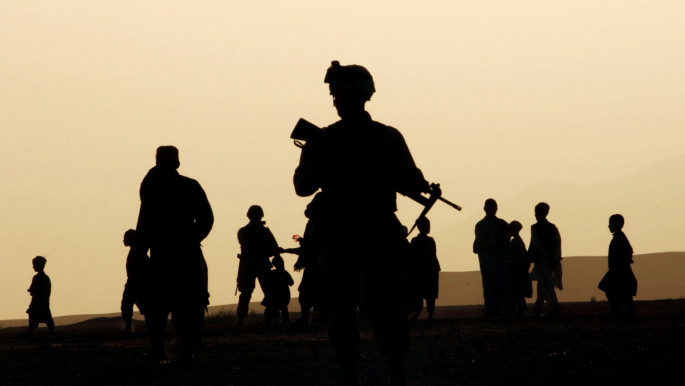As clock ticks, Biden's peace plan risks alienating Afghanistan's rival powers
Included in the proposal, which was leaked in early March along with a letter from US Secretary of State Anthony Blinken, are guidelines for a new constitution, which would guarantee the protection of women's, children's and minority rights.
In his letter, Blinken outlines a fast-track diplomatic process that includes peace talks in Turkey and would bring in the UN, Russia, China, Iran, India and Pakistan to shape an internationally acceptable Afghan solution.
However, the White House's aggressive attempt to expedite peace talks was not well received by the Afghan government. Responding to the proposal, Afghan Vice President Amrullah Saleh said his country would "never accept a bossy and imposed peace".
US efforts to force the creation of an interim government are also likely to have irked Afghan leaders. President Ashraf Ghani previously said that no such government would be formed "as long as I am alive".
For the Taliban, the American proposal failed to address the key issue of troop withdrawal. For the entirety of the two-decade conflict, ejecting the foreign military presence has been the main objective of the Islamist militants.
 |
The White House's aggressive attempt to expedite peace talks was not well received by the Afghan government |  |
Biden's impatience is understandable given the 1 May troop withdrawal deadline agreed in February 2020 under the Trump-administration brokered US-Taliban peace deal. The United States agreed to remove its troops in exchange for the Taliban meeting certain conditions, which included preventing the country from being used as a base for al-Qaeda operatives.
The previous deal sidelined the Afghan government and proved unpopular with many who accused former US President Donald Trump of conceding too much ground to the Taliban.
 |
|
| Read more: Assassination campaign targets intellectuals in Afghanistan |
Trump's deal, negotiated by the current envoy Zalmay Khalilzad, was an "utter failure" according to Rani D. Mullen, professor at William & Mary public research university and Visiting Senior Research Fellow at the Institute of South Asian Studies in Singapore.
The deal which included a prisoner swap in which 5,000 Taliban prisoners were to be released in exchange for 1,000 Afghan security personnel "handed away the major negotiating tool that the Afghan government had at its disposal, namely the 5,000 Taliban prisoners, some of whom were clearly terrorists," Mullen told The New Arab.
Ghani criticised the prisoner exchange, arguing that the US was in no position to offer such a trade.
The Biden administration's proposal comes amid a deteriorating security situation in Afghanistan, as the Taliban has in recent weeks sought to sow fear and expand the territory under its control. If successful, the land grab would increase its leverage in future peace talks.
A thriving narcotics trade and systemic corruption further compound the Afghan quagmire. In 2018 Afghans paid $1.65 billion in bribes, according to a research report by Integrity Watch Afghanistan. In comparison, the government brought in $1.12 billion from taxpayers during the same period.
 |
For the Taliban, the US proposal failed to address the key issue of troop withdrawals. For the entirety of the two-decade conflict, ejecting the foreign military presence has been the group's main objective |  |
Biden is facing domestic pressure to stick to his 2020 campaign promise. In response to a question from the Council on Foreign Relations, Biden vowed to get US troops out of Afghanistan in his first term.
The longest war in US history has come at great expense, specifically $2 trillion and more than 2,300 American lives. With the deadline just six weeks away, a peace deal by 1 May seems highly unlikely with the two sides so far apart. With time running out, and no good options, Biden will soon be forced to decide on troop withdrawal.
The first option is a complete withdrawal and the continuation of negotiations from outside the country. The second is an extension of the timetable for withdrawal, perhaps tying it to progress on peace talks in the hope of getting an agreement in place before US troops depart.
 |
|
| Read more: Can Biden end America's forever wars? |
The third option, increasing US troop numbers, is unlikely given Biden's record during his time as vice president under Barack Obama.
Any of the three could lead to increased instability and violence, but a complete withdrawal without any peace deal in place is likely the most risky. With no military presence in the country, the United States would have no leverage to push back the Taliban. Biden will surely want to avoid a repeat of the mistakes made in Iraq in 2011, when a nearly complete withdrawal led to increased violence, widespread instability and a power vacuum filled by the Islamic State (IS).
At the same time, violence in Afghanistan will almost certainly escalate if the US reneges on its commitment to withdraw troops. "If [the Americans] remain in Afghanistan after [the deadline]," Sher Mohammad Abbas Stanikzai, the deputy Taliban peace negotiator, warned in January, "we will also kill them".
 |
With time running out, and no good options, Biden will soon be forced to decide on withdrawing troops |  |
The White House's 11th hour moonshot seems sure to fail. While Biden's proposal is ambitious and comprehensive, it has upset Afghan lawmakers and failed to address the key Taliban issue of troop withdrawal. Continuing to push for a political settlement, at this late date, may be a case of flogging a dead horse. The Taliban have shown little interest in a peaceful political settlement and may be happy to wait out the 1 May deadline.
"The Biden administration is repeating the Trump administration's mistake of focusing on reconciliation with the Taliban, instead of reaching an agreement with the Afghan government on maintaining security after a US drawdown," former Pakistani Ambassador to the US Husain Haqqani, now a senior fellow at the Hudson Institute, told The New Arab.
 |
|
| Read more: Blinken to Afghan president: play ball or get out of the way |
He argues that the Islamist militant group would never accept any power-sharing agreement or seriously commit to a joint interim government. "The Taliban insist on restoring their emirate and cannot be trusted to keep their promise," says Haqqani. "The Taliban ideology precludes sharing of power as their movement exists to impose the will of God."
The Biden administration could change tack and seek a multilateral solution that is condition-based rather than timeline-based while putting in place a plan to ensure security and stability after the departure of US troops. Or the US could withdraw their troops without further weakening the elected Afghan government's negotiating position vis-à-vis the Taliban.
But the US president needs to move fast - the stakes are as high as they've ever been.
Hannah Wallace is a London-based writer and researcher on armed violence and foreign affairs



